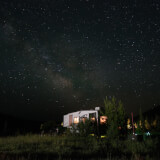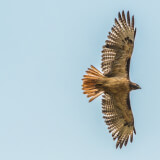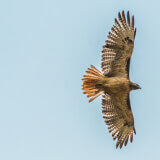Get Involved: Resource Stewardship
Become part of an enthusiastic community that shares your passion. Volunteers are critical in all parts of Resource Stewardship. Volunteer today!

Dark Sky Monitoring
Assist state parks in learning more about the quality of the night sky by collecting measurements of light pollution at night. CPW is working to document sky brightness in State Parks through the Dark Sky Monitoring community science program. We connect volunteers with tools to collect dark sky data that can be used to help preserve and protect the nighttime environment and our heritage of dark skies.
Help us identify parks for recognition of their Dark Sky quality so that astronomers, campers, and nighttime photographers know where to see the Milky Way, escape to true nighttime, and enjoy the natural night sky!
Using a smart phone or printed star charts, our Dark Sky monitors take a few minutes on moonless nights to document how many stars can be seen with the naked eye. Observations can be made year round in different moon phases (new moon is best). To fully document a park's night sky quality, multiple measurements need to be taken, depending on the size of the park the time commitment would vary. Observations may be made in any state park that allows overnight recreation - please check the state park website before visiting! No experience needed.
- more...
Ready to get involved?

Raptor Monitoring
Welcome to Raptor Monitoring!
Raptors are keystone predators - animals without which the ecosystem would fail.
Raptors are carnivores, and their food base is comprised of fish, mammals, and reptiles. If there is a lack or decline in raptor population, one of the reasons is often lack of prey species. Therefore, these top-level carnivores provide insight into populations of small animals within the parks.
Some raptors have specific breeding and nesting needs that can indicate something about the functions of the larger system. Bald eagles and northern harriers provide good windows into the ecosystem puzzle, and whether certain areas of the park may be experiencing excess disturbance. From there, we can formulate suggestions about how to promote healthy system functioning.
Besides these invaluable benefits, raptors are amazing, charismatic creatures that are relatively easy and a whole lot of fun to monitor! It’s a great way to learn about the ecosystem and get volunteers involved in public land stewardship and management.
Seeing a bird of prey in the wild is an incredible experience and one that is quite common in many of our state parks. We want to keep it that way. By staying on top of the whereabouts, behaviors and populations of the raptors that call our parks home, we can plan ahead when considering land use and recreation changes. By protecting their territory and allowing them their space, we carry on the opportunity to spot a raptor for generations to come.
Responsibilities:
1.) Must become trained as Raptor Monitor by CPW Resource Stewardship and able to make at least a 1-year commitment
2.) Intermediate raptor identification skills and access to necessary equipment such as binoculars or a spotting scope required.
3.) Become familiar with a particular State Park and observe raptors during both the winter and the summer nesting season twice per month.
4.) Use email and computers to enter data and communicate with the project managers.
5.) During the winter, travel around the park on a regular basis, visiting winter monitoring points and following a standardized monitoring protocol to observe and record raptor activity. During the summer, identify and monitor raptor nests. Follow a standardized monitoring protocol to observe and record raptor nesting activity. Complete raptor monitoring datasheet for every formal observation and enter data in online database.
6.) Attend meetings and training events.
7.) Have a good time and get recognized for your efforts!
QUALIFICATIONS DESIRED
- Have own transportation and be willing to travel to site
- Ability to walk the site. Length and level of difficulty of getting to site varies by park. Some require only minimal walking. Others require traversing sometimes difficult and unmarked terrain (such as at State Forest, Mueller, Spinney/Eleven Mile, Staunton, Eldorado, and Golden Gate).
- more...
Ready to get involved?
Apply online to become a volunteer.
Questions? Contact Donovan Spaulding
(720) 595-6030

State Parks NatureFinder
Help collect data on the biodiversity of state parks! iNaturalist is a mobile app and online network where you can record what you see in nature, meet other nature enthusiasts, and learn about the natural world. The Resource Stewardship Program at CPW manages the State Parks NatureFinder project, which provides volunteers, staff, and visitors the opportunity to assist in ecological monitoring.
To participate, simply download the free iNaturalist app on your mobile device or visit iNaturalist.org to set up a free account, then join the State Park NatureFinder project by visiting https://www.inaturalist.org/projects/state-parks-naturefinder and clicking "Join this project" in the upper right corner. Observations or identifications need to be within the boundaries of a Colorado State Park.
State Parks NatureFinder Project Terms & Rules:
- Remember to always be respectful of wildlife and keep these viewing and photography guidelines in mind. By following these guidelines you are helping promote conservation of wildlife and their habitats, as well as the safety of yourself and others! - Wildlife should be viewed/photographed from a safe and respectful distance.
- Use binoculars, spotting scopes, zoom lenses, and viewing blinds to avoid disturbing species.
- Avoid getting close to nests or dens, your presence can disturb breeding and alert predators to nest/den locations.
- Never post locations of nests/dens.
- Stay on trails and roads, tread lightly, and leave plants and animals where you find them.
- Do not use recorded animal calls to attract wildlife.
- If an animal shows any sign of stress, move away.
- Keep pets on leash at all times.
- Do not feed wildlife.
- more...

 View Current Opportunity List
View Current Opportunity List